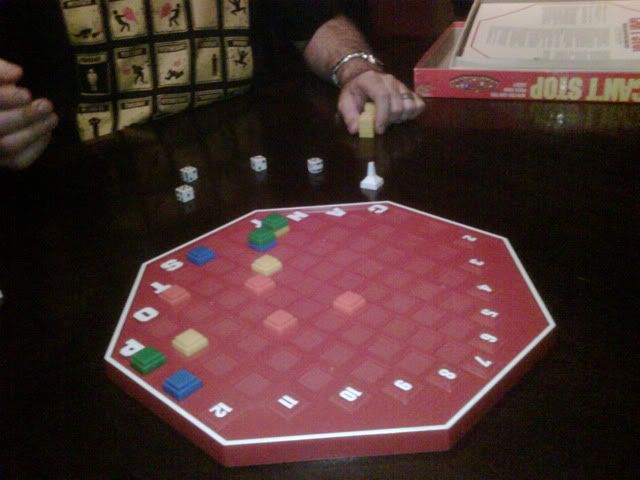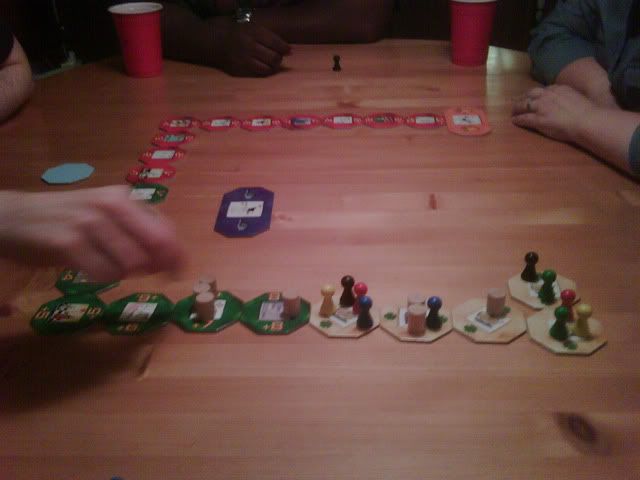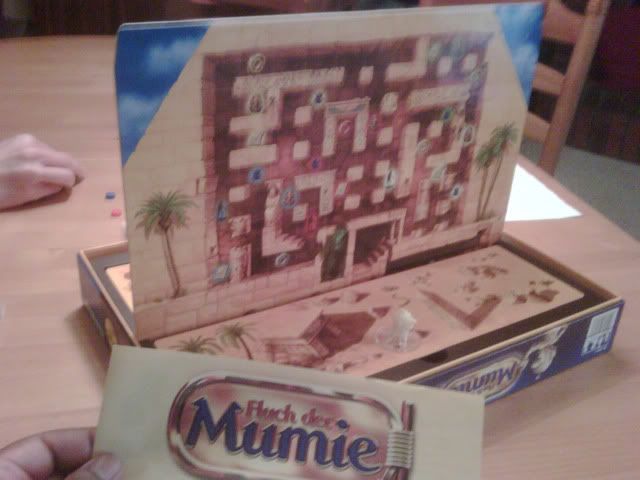I wandered to two very different but very fun gaming sessions over the last couple of nights. Saturday night was spent in Dallas doing party games and a teaching Dominion to a complete newcomer to premium board games. There was also beer pong and trivia, and I was once again reminded why most mainstream trivia games like Cranium suck so hard. No matter how good you might be, you might get screwed by a die roll, or by some other happenstance that makes the outcome of the game totally random. You play for an hour or two, and it might be fun but all of the energy is lost in either a grind or in what amounts to a roll of the dice or a coin flip. In the end, only one team or person's having fun, while everyone else wonders if this was really worth their time.
Then there was Sunday night with my usually group of gamers in OKC, where I played three games that properly used dice as the primary mechanic, but managed to each be quite fun in their own ways.

It's easy to dismiss a game that's old for no better reason than just that. It's old, and surely something better has come along since then. Games like Monopoly, Risk, and Life, are all trumped by games like Agricola, Small World, and Verflixxt! (more on this one later). This cannot be said about the excellent Can't Stop.
Can't Stop severely lacks in the aesthetic department. The packaging for Can't Stop is almost comically antiquated. The cheesy-looking plastic board and cheap plastic pieces belie the truly awesome game this is. The idea is simple. Roll dice and work to roll the same number a certain number of times. You can stop at anytime and "save" your progress, or you can risk losing whatever ground you've gained to beat everyone else to the goal. It's an ingenious implementation of risk versus reward, and well worth trying out at least once. The game is played in about 15 to 20 minutes even with new players, and rivals Bluff as my favorite light social dice-rolling game.

I thought I was done with Roll-and-Move games like Chutes and Ladders and The Game of Life when I hit puberty. The before-mentioned games are great for kids, but offer very little for adults. If board games for kids were analogous to movies for kids, Verflixxt! would be a Pixar movie. There is literally something for all ages.
The rules are extremely simple. Roll the die and move one of your two tokens. If yours is the last token leave a space, you take that space for yourself. Once both your tokens have reached the finish line, you count the score on your collected spaces. The player with the highest score wins. There are a few catches and caveats, but nothing overly complicated. This is a very simple game at heart, and it's amazing how much fun a roll-and-move game can be as an adult. There's backstabbing and conniving that is seemingly out of place for such a straight-forward game, and it's wonderful to find this kind of thing fun again.

Last week I reviewed Nuns on the Run, and expressed my disappointment in what I thought was a good game that simply got lost in itself. The theme was neat, but the game took too long to play and was heavily weighted for the Nun team. This weekend, I got to play yet another hide-and-seek board game called Fluch der Mumie, or Pyramid here in the states.
Using a clever board and magnet system, the players try to gather treasure in a recently discovered Egyptian pyramid. Their goal is to get all of their assigned treasure before anyone else. Opposing them is the pyramid's original inhabitant, a mummy, who's not too happy about his stuff getting stolen. His job is to capture the players a total of seven times, and catching any one player three times eliminates that player.
This game is far superior to Nuns on the Run in all ways. The game is shorter, the theme is just as funny, and the mummy never really feels like he's completely out of the game. The balance just about perfect, as was demonstrated by the mummy winning twice and a player winning once in our three plays. Just for reference, we learned Fluch der Mumie and played three games in the same time as one learn/play session of Nuns on the Run. Given the fact that the box and board art are well-done and hilarious, this game is a great addition to the collection.


0 comments:
Post a Comment